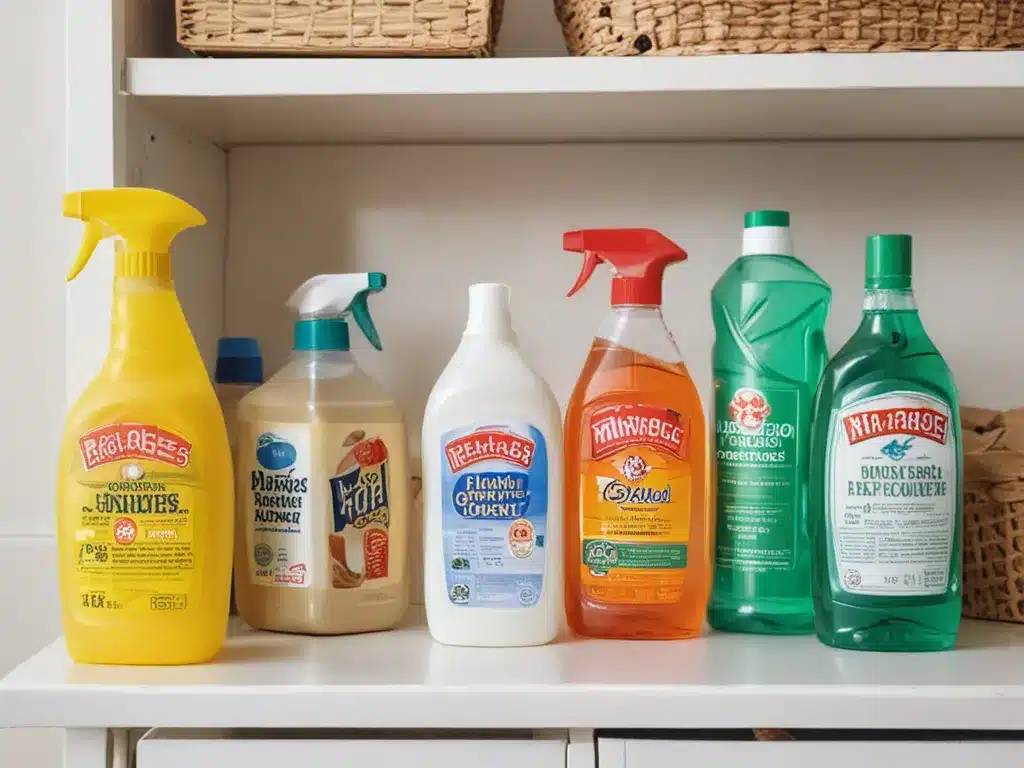As a busy person trying to keep my home clean and hygienic, I’m always on the lookout for effective cleaning solutions that don’t cost a fortune or contain harsh chemicals. Recently, I discovered that one of the most powerful cleaners was already in my cupboard – white vinegar!
The Many Cleaning Uses of White Vinegar
While white vinegar is commonly used in cooking and salads, its acidic nature makes it a versatile cleaner and disinfectant for multiple household surfaces and materials. Here are some of the ways I’ve been using it:
Grease-Cutting Properties
- White vinegar is excellent at breaking down grease and grime. I mix equal parts vinegar and water in a spray bottle and use it to clean:
- Kitchen counters and appliances
- Bathroom tiles and fixtures
- Oven hoods
- Microwaves
- The acidic vinegar dissolves soap scum, food residue, and other oily grime easily and without harsh scrubbing.
- It’s safe for most surfaces but test on a small area first to check for adverse reactions with stone, grout, and metals.
Disinfecting Capabilities
- With its antimicrobial properties, a vinegar solution is ideal for sanitizing and disinfecting areas prone to mold, fungi, and bacteria buildup like:
- Toilet bowls
- Sinks, tubs, and showers
- Pet areas and litter boxes
- I spray a 50/50 vinegar and water solution, let sit for a few minutes, then wipe down with a clean cloth.
- The vinegar smell fades quickly once dry and leaves no chemical fumes.
Streak-Free Glass and Window Cleaner
- For sparkling clean windows and mirrors without streaks or residue, I mix:
- 1 part white vinegar
- 1 part rubbing alcohol
- 2-3 parts water
- The vinegar cuts through grease, soap scum, and grime while the alcohol helps evaporate quickly.
- I use this solution on:
- Windows
- Mirrors
- Glass doors
- Eyeglasses
- Computer and TV screens
All-Purpose Surface Cleaner
- For cleaning and disinfecting all around my home, I keep a spray bottle filled with:
- 1 part white vinegar
- 1 part water
- I use it on:
- Kitchen and bathroom countertops
- Appliances like the refrigerator and stove
- Wooden cutting boards and utensils
- High chair trays
- Pet bowls
- Garbage cans
- The natural vinegar solution cleans and deodorizes without leaving chemical residues on surfaces.
Mopping Floors
- I fill my mop bucket with a solution of:
- 1/2 cup white vinegar
- 1 gallon warm water
- This removes dirt effectively and leaves floors shining without hazy buildup or streaks.
- The vinegar smell fades as soon as the floors dry.
- It’s safe for use on:
- Hardwood
- Tile
- Laminate
- Linoleum
Deodorizing and Disinfecting the Washer
- Over time, residue and bacteria can build up in the washing machine leading to odors and mildew.
- Once a month, I run a wash cycle on hot with:
- 2 cups white vinegar
- No clothes
- The vinegar breaks down detergent residue and disinfects the drum, drain, and hoses leaving my washer fresh.
Weed Killer
- The acetic acid in white vinegar is an effective natural herbicide.
- I mix 1 part vinegar with 1 part water in a spray bottle and use it to kill weeds by:
- Spraying unwanted vegetation
- Targeting weeds through cracks in the sidewalk or driveway
- It may take a few applications but the vinegar dries out and kills unwanted plants within a week or two.
Pet Odor Remover
- White vinegar neutralizes odors naturally rather than masking them.
- For pet urine stains on carpets and floors, I blot the area then spray directly with undiluted white vinegar. This discourages pets from re-marking there.
- I also add 1/2 cup vinegar to the rinse cycle when washing my pet’s bedding and supplies to remove odors.
Produce Wash
- Washing fruits and vegetables with a vinegar solution removes pesticides, wax, and bacteria.
- I mix 1 part white vinegar with 3 parts water and submerge produce before rinsing.
- This is a cheap and effective way to clean fresh produce without buying commercial wash products.
Is White Vinegar Safe?
While white vinegar is a strong acid, when diluted properly it is generally safe for most household cleaning purposes. However, here are some precautions:
- Test on an inconspicuous area first, especially on porous or delicate surfaces.
- Avoid getting vinegar on marble, granite, and stone as it can damage minerals and etch surfaces.
- Don’t mix vinegar with bleach or ammonia – this creates toxic fumes.
- Use adequate ventilation when cleaning with vinegar.
- If irritated by the smell, add lemon juice to counteract.
With some care and proper handling, white vinegar is an economical eco-friendly cleaner that belongs in every household! Keep a spray bottle diluted with water handy and discover the transformative cleaning power of this pantry staple.







